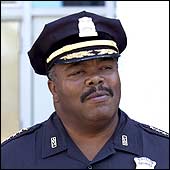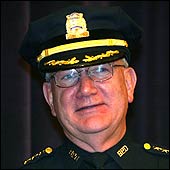By Donovan Slack and Suzanne Smalley, The Boston Globe
| |
| |
|
Boston Police Commissioner Kathleen M. O’Toole yesterday removed from their commands two senior officers in charge of operations the night police shot and killed 21-year-old Victoria Snelgrove with a crowd control projectile.
Superintendent James M. Claiborne, who commanded overall operations on Oct. 21 when Red Sox fans rioted around Fenway Park, and who was in charge of all uniformed officers, was transferred to what one police official called “the middle of nowhere,” the Boston Police Academy.
Deputy Superintendent Robert E. O’Toole, who commanded operations around the ballpark and encouraged officers to shoot the FN303 projectiles that killed Snelgrove and injured two others, was reassigned to special events planning in the bureau of field services. He had been in charge of the department’s special operations division, which includes canine, motorcycle, and SWAT units.
The commissioner said the reassignments had nothing to do with the Snelgrove shooting, but were part of a “routine reshuffling” of her command staff.
“When I made my first command staff appointments last year, I indicated that I would not hesitate to shuffle the deck throughout my tenure here and I felt it was time to do so,” O’Toole said in an interview yesterday. “I felt this was a time to infuse some great new blood into the command staff and to realign some other people.”
Inside the department, however, the changes are seen as direct results of an internal investigation into the Snelgrove shooting, according to three officers who spoke on condition of anonymity. The department is expected to release the results of that investigation in early March.
The two reassignments were among 12 personnel changes announced yesterday, constituting the second major overhaul of the department’s command staff since O’Toole became commissioner in February 2003. In some cases, she ousted the very people she had promoted in the earlier shakeup, including Claiborne and Robert O’Toole.
Claiborne declined to comment last night. Robert O’Toole, who is not related to the commissioner, said through a department spokesman that he is looking forward to his new assignment.
Among those demoted were the head of the department’s 911 service, which drew heavy criticism in a survey of residents, and the chief of its beleaguered fingerprint unit, which is being revamped after it was blamed for a wrongful conviction in a police officer’s shooting.
During the rioting after the Red Sox beat the Yankees to clinch the American League pennant, Claiborne supervised overall police operations from within a command center at police headquarters. Robert O’Toole handed out pepper-pellet guns to officers not officially certified to use the weapons and began shooting one himself, according to two law enforcement officials briefed on the investigation and an officer on the street that night. O’Toole was himself not certified to use the weapon, his training records show. Snelgrove was struck in the eye and two other fans were struck in the face.
Soon afterward, the commissioner created an independent panel headed by former US attorney Donald Stern to investigate the shootings, and also launched an internal investigation.
“I have no intention of doing anything from a disciplinary perspective until that investigation has run its course,” the commissioner said. “It would have been very easy for me in the aftermath of [the Snelgrove shooting] to scapegoat someone, but it would not have been the right thing to do.”
Robert O’Toole will remain on administrative duty pending the completion of the investigation, she said.
The bulk of the internal report on the Snelgrove death already has been finished, with some cataloguing of videotapes, typing, and graphics still left undone, according to one officer involved in the investigation and another briefed on its progress.
The commissioner replaced Claiborne with Superintendent Robert Dunford, who headed the department’s security planning during the Democratic National Convention and who also ran police operations after the World Series last year and the Super Bowl on Sunday. All were deemed successful events for the police, but Dunford also was the incident commander during post-Super Bowl rioting last year, when James Grabowski, 21, was struck and killed by a sport utility vehicle on Symphony Road. He now commands all uniformed officers.
An internal investigation of police operations that night concluded that Dunford “did not properly monitor or command the overall citywide tactical situation. He was at times unresponsive to radio communications. He hesitated on giving tactical commands when necessary.”
The commissioner said yesterday that Dunford “assumed command that night by default.” “He . . . was able in retrospect to point to lots of weaknesses and make many recommendations in how we could improve public order management and special events after that,” she said.
Claiborne’s reassignment is particularly unpopular among the rank and file, several officers said yesterday. He had climbed his way to the department’s top ranks since joining the department as a patrol officer in 1979.
“It’s shocking, shocking,” said one police official briefed on the commander’s transfer, who spoke on condition of anonymity. “The guy does the job, and he has the respect of the guys on the street, and that’s who actually gets the job done.”
His transfer also raised questions among some officers about the commissioner’s commitment to diversity in her operational command staff. Claiborne is the highest ranking African-American in the department, and another high-ranking African-American officer, Deputy Superintendent William H. Bradley, was demoted and transferred, though the commissioner promoted one Asian-American, Lieutenant Kenneth Fong, and an African-American, Sergeant Detective Michael A. Cox, in the shakeup.
Two other African-American commanders, Superintendent Bobbie Johnson and Deputy Superintendent Charles Horsely, are expected to retire later this year.
Officer Angela Williams Mitchell, who is the president of the Massachusetts Association of Minority Law Enforcement Officers, said she is outraged by Claiborne’s removal from O’Toole’s inner circle and plans to launch a campaign to protest the decision with elected officials.
“Superintendent Claiborne has been transferred from the Bureau of Field Services, the most influential bureau in the department, to professional development, which is the least influential in the department,” Mitchell said.
The other staffing changes announced yesterday and effective tomorrow include several demotions. Superintendent William M. Casey, who had presided over the Bureau of Administration & Technology, which includes the troubled fingerprint unit, is being demoted to deputy superintendent and will be moved to the Office of Administrative Hearings. Deputy Superintendent Margaret O’Malley is being demoted to captain and sent from the commissioner’s office to the academy.
Bradley is being demoted to the rank of sergeant and will be reassigned from his post supervising the department’s 911 service center to work in the Bureau of Internal Investigation. In the recently released survey conducted for the department among city residents, the 911 center was rated lower than at any time since 1997, and the report’s authors suggested that the department examine the management and training of 911 operators. He will be replaced by Fong, who will be promoted to the rank of deputy superintendent.
Four other officers were promoted to the rank of deputy superintendent. They include Lieutenant Kevin D. Foley, who currently oversees media relations; Cox, who now works in the department’s intelligence unit and who was badly beaten in 1995 by Boston police officers who mistook him for a murder suspect; and Sergeant Darrin P. Greeley, who was a member of the commissioner’s transition team when she took over the department and who also works in the intelligence unit. Captain Thomas F. Lee will take over Robert O’Toole’s position with special operations.
Foley will take over labor relations in the commissioner’s office, while Cox will work in the chief’s office at the Bureau of Investigative Services and Greeley will move to the chief’s office in the Bureau of Field Services. Superintendent John F. Gallagher will be moved from the Police Academy to the commissioner’s office.




